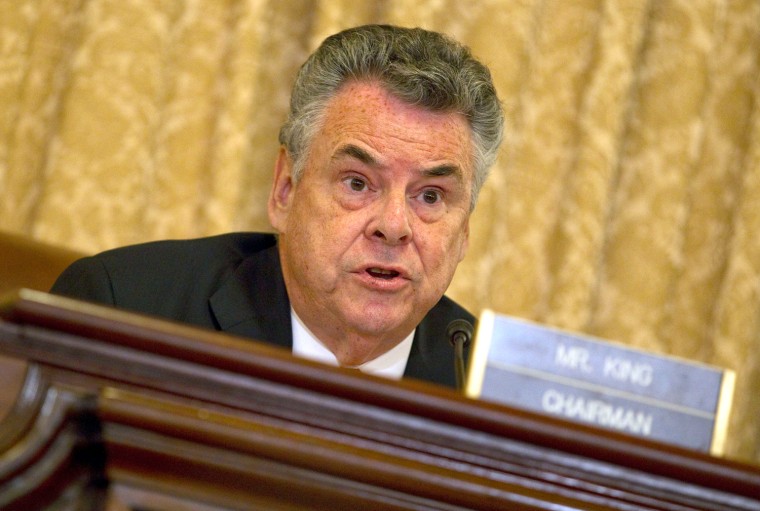The head of national security issues in the House of Representatives on Thursday announced legislation to revive the 9/11 Commission to look at progress in deterring terrorism threats, with new emphasis on homegrown radicalized Muslims.
The 9/11 Commission Review Act, introduced by Rep. Peter King, R-N.Y., chairman of the House Homeland Security Committee and Rep. Frank Wolf, R-Va., would reinstate the panel that disbanded in 2004. The reconstituted commission would evaluate progress on meeting the recommendations made by the panel set up after the 2001 terrorist attacks, as well as “examine emerging national security threats, including domestic radicalization.”
King has been spearheading a controversial effort to focus on homegrown Islamic radicalization by hosting three hearings on the issue since March.
The third of these hearings on Wednesday focused on efforts by a Somalia-based group, Al Shabaab, to recruit young Somali Americans. A previous hearing looked at Islamic radicalization in prisons.
The most controversial of the three, however, was a hearing in March based on the premise that radicals are operating within many American mosques, and that the mosques are not cooperating with law enforcement to ferret out violent extremists.
Civil rights groups, interfaith organizations and Muslim organizations have challenged King’s accusations of non-cooperation and protested that the hearings unfairly cast suspicion on the entire Islamic community and encourage bigotry against Muslim citizens.
Even seemingly benign initiatives taken by King are viewed with suspicion by critics in that camp.
But the move to revive the 9/11 Commission won immediate praise from one of the harshest critics of Islam, Daniel Pipes, founder of the Middle East Forum, a conservative think tank.
“Both (King and Wolf) stressed that such a reconstituted body would also be directed to further explore the threat posed by the increasing radicalization of American Muslims, an item driven home today with the arrest of a Muslim soldier ... on terror related charges,” he wrote.
The press release announcing the bill was sent Thursday, the day that police in Texas announced the arrest of Army Pfc. Nasan J. Abdo in connection with an alleged plot for a bomb attack outside Fort Hood.
The bill was submitted the previous Friday, when the big news story of the day was mass killings by a right-wing Caucasian Norwegian who believed himself to be on a mission to save his nation from Muslim immigrants. Before his bombing and shooting attacks left 76 dead, Anders Behring Breivik wrote a 1,500-page treatise citing American bloggers and pundits who argue that Islam mandates violence in Allah’s name.
The news re-ignited a fierce war of words between King and his critics. An op-ed column in The New York Times characterized the congressman and others as “ideological fellow travelers” of Breivik.
Columnist Roger Cohen named King as one who has “found it politically opportune to target "creeping Shariah (Muslim law) in the United States.'"
King opened Wednesday’s hearing with an attack on the “vacuous ideologues” at The New York Times and others who have suggested that his inquiry should look at terrorism more broadly.
“I will not back down from holding these hearings,” King declared in his opening statement.
“If they had even a semblance of intellectual honesty, the Times and others would know and admit that there is no equivalency in the threat to our homeland from a deranged gunman and the international terror community apparatus of al-Qaida and its affiliates who are recruiting people in this country and have murdered thousands of Americans in their jihad attacks,” King said.
King’s office did not respond to a request to discuss the proposed legislation.
The ranking Democrat on the Homeland Security Committee, Rep. Bennie Thompson of Mississippi, questioned the motivation behind King and Wolf’s bill: “There has never been a discussion for a need of a commission to review the 9/11 Commission, which issued its report in 2004,” he said. “We’re not sure what Mr. King is after.”
Wolf’s office said the legislation was proposed because President Barack Obama had not acted on the congressman’s requests.
“Congressman Wolf has been asking the president to bring the commission back by executive order for more than a year and a half, since the attack at Fort Hood (allegedly by Maj. Nidal Hasan) and the failed Christmas Day bombing in 2009,” said Joe McNulty, a spokesman for Wolf.
He said that the commission would minimize politics by bringing back together the bipartisan group of experts to examine new threats.
“Given the evolution of the terror threat, including the troubling rise of domestic radicalization inside the U.S., bringing back the commission provides an opportunity for an independent bipartisan assessment of how we can best detect and deter future terror attacks,” the emailed comment said. “And Hamilton and Kean are considered the bipartisan experts on this issue – there are no better statesmen to look at this problem and provide recommendations to Congress and the administration.”
Republican Thomas Kean and Democrat Lee Hamilton were chairman and vice chairman of the 9/11 Commission (formally, the National Commission on Terrorist Attacks Upon the United States).
Kean and Hamilton are now co-chairs of the National Security Preparedness Group of the Bipartisan Policy Center, a Washington-based think tank. In a September 2010 report, it published a comprehensive report on terrorist threats to the United States, including the threat of radicalization affecting "both immigrant and indigenous Muslim communities."
"The conventional wisdom has long been that America was immune to the heady currents of radicalization affecting both immigrant and indigenous Muslim communities elsewhere in the West," the BPC report said. "That has now been shattered by the succession of cases that have recently come to light of terrorist radicalization and recruitment occurring in the United States."
The organization did not immediately respond to a query for comment on the King-Wolf bill.
